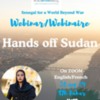Thank you very much Sarah for your comment and my apologies for the delay in replying.🙂
I want to start by saying that I am not an ''expert'' in welcoming refugees, but I have witnessed many of them and supported some, so I can share some of my experience. I hope it will help.
In order to be more specific with my suggestions, I would need to know more about your mother in law: what was her occupation in Sudan? What is her religion? Does she speak English? And more... If you would like us to discuss a little bit more, you can reach out to me anytime at mariontransetti@gmail.com or on WhatsApp at +221 78 105 07 24 🙂 It is really up to you. Don't hesitate if you need to, don't feel bad if you don't feel like it! 😊
Now ''in general'' about ''refugees'', here are a few things I have witnessed.
1 - The word ''refugee'' hurts them way more than we can even imagine. It is OUR effort to try to NOT use it at all. Like we shouldn't say : this is X, she is my MIL, she is a refugee. Rather, we just say, this is X, she is my MIL, she is from Sudan. It belongs to HER to say more or not aout her ''status''. 🙂
2 - The second thing is that after such a trauma, people go through many phases: tears, acceptance, anger, hope, and it is totally random, we never know when which one is going to kick in and we have to respect this and let all of this be expressed. The anger one is not easy at all, but we have to always remember that it is very legitimate. We should never say things like: '' I understand, BUT...'' There is no but. Anger has to get out if it has to. We aknowledge and support. It will pass, at some point.
3 - People arriving after having been displaced leave IN THE MOMENT. All plans for the future won't help. Talking about what will happen next week generally doesn't help. They generally have very small requests FOR THE DAY and this is what we should be very attentive to (it reminds me of a young lady who started crying because she asked for a comb and we didn't provide saying we would buy it the day after. It was what she needed a that precise moment to feel okay with her hair and her being as a whole, and we should have been more receptive to her request). The rest will follow at some point.🙂
4 - And of course, talking about Sudan, meeting with Sudanese (in person or on Zoom), etc... it has to be on HER own terms. She will tell you if she wants this to happen.
What would make HER feel at home, she is the only one to know. What would it be for you or for me? Probably some very different things. Sometimes ''home'' is related to food, sometimes to music, sometimes to some photos she might have saved. Who knows? HER 🙂
For instance, I want to give the example of a woman arriving in Canada from Djibouti. She took the situation as ''a fresh start'', even a ''gift'' from her God. Yes, a ''fresh start''. She didn't want to hear a word about her country. She studied, then found a work and started a brand new life. Till today, she doesn't speak about Djibouti. That is her choice. We respect.
5 - And one last thing very important: we are not shrinks 😊 We do our best with all our humanity and empathy, but some healing will have to happen and we have no control on that. For that too, it will be on HER own terms.
I don't know if my answer helps you. I hope it does, even just a little bit.
I want to finish by saying that, of course, I am in touch with many Sudanese in Sudan, in African countries and from the diaspora all over the world, so I can connect you with them anytime. But... only if SHE wants it 😊
Thank you very much for reaching out, and so much for welcoming your mother in law from Sudan. Thank you simply for caring 🤗 It is the most important step and you have already get through it 🎁
Peace,
Marion
You are all invited to this webinar about war in Sudan! 🙂
